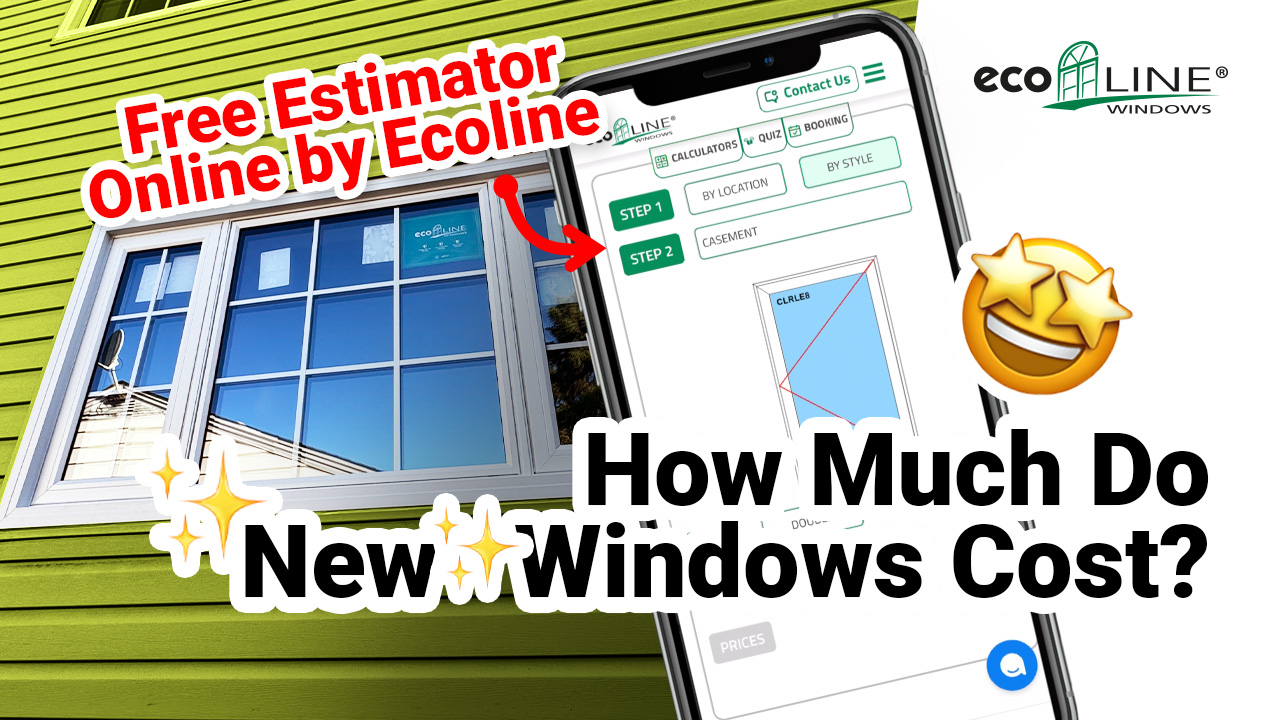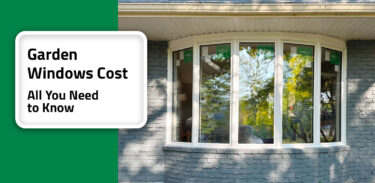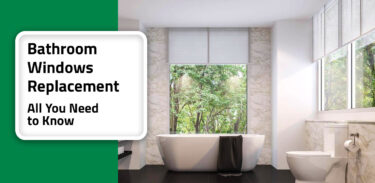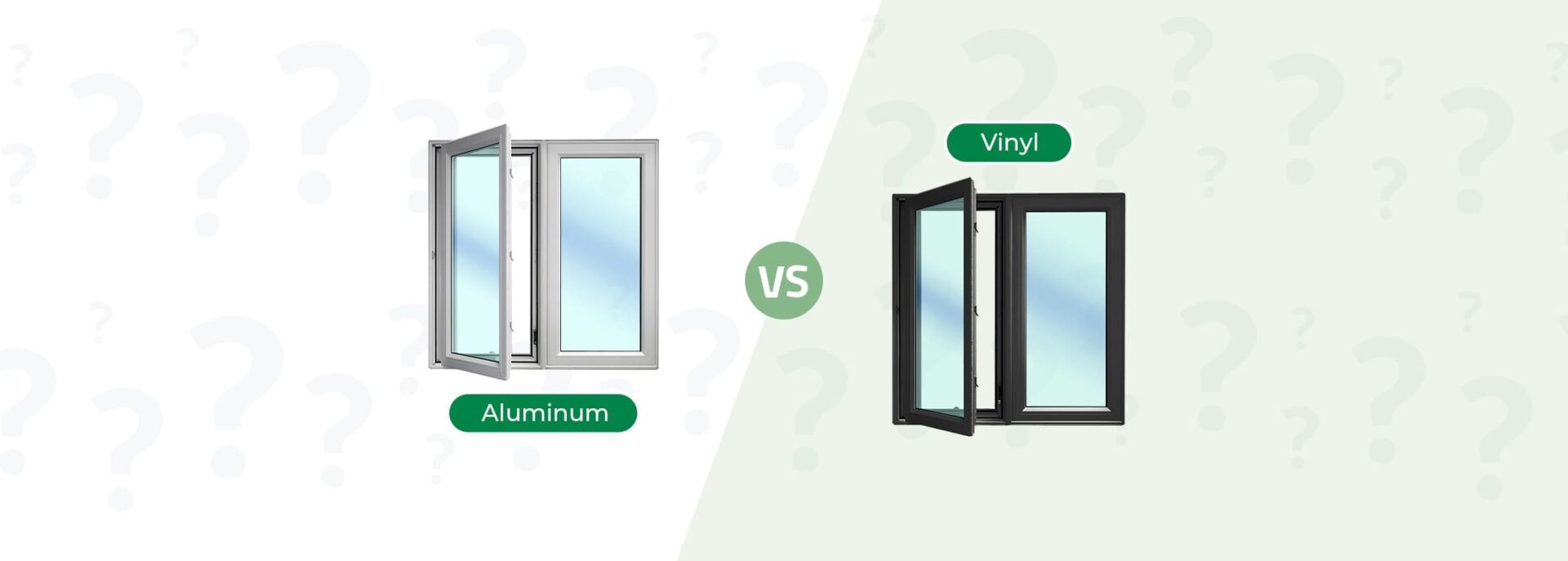

Aluminum vs. Vinyl Windows Ultimate Comparison: Pros, Cons and Costs [2025]
Apr 8, 2025
9 min read
2265
When it comes to enhancing the comfort and appearance of your home, window replacement is usually seen as the top priority for renovation among homeowners. And since windows are highly customizable units, the choice of window material plays a pivotal role.
The buzz about which windows are better – aluminum or vinyl – is a hot topic among homeowners and industry experts alike. Each material offers a clear set of advantages that cater to different preferences, needs, and architectural styles.
This ultimate window material comparison guide provides the latest insights needed to make an informed decision about your window replacement project, discussing the pros, cons, and prices of aluminum vs vinyl windows in 2025.
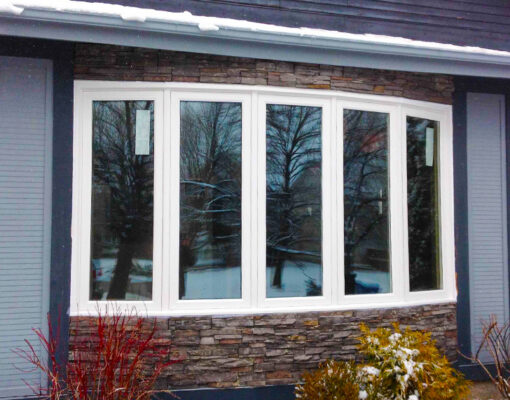
Shopping for New Vinyl Windows?
Aluminum or Vinyl Windows – Pros & Cons
| Aluminum Windows | Vinyl Windows | |
| Pros: | ✅ More Durable | ✅ More Energy-Efficient |
| ✅ Better Security | ✅ Cost-Effective | |
| ✅ Higher Noise Insulation | ✅ Longer Lifespan | |
| ✅ Have Thinner Frame | ✅ No Discolouration | |
| ✅ Higher ROI | ||
| ✅ Better Customisation | ||
| Aluminum Windows | Vinyl Windows | |
| Cons: | ❌ More expensive | ❌ Thicker Frame |
| ❌ Prone to scratching | ❌ Worse Noise-Insulation | |
| ❌ Less Energy-Efficient |
Appearance & Aesthetics
Choosing between aluminum and vinyl windows isn’t just about functionality—it’s about setting the tone for your home’s visual appeal. Moreover, your home’s architectural style can also significantly impact the window choice.
Aluminum Windows:
- Sleek and Modern: Ideal for those who love contemporary design, offering thin frames that maximize views and light.
- Fixed Frame Colours: Aluminum windows are typically available in a range of factory finishes but are not paintable, which can limit customization options.
Vinyl Windows:
- Versatile Designs: Comes in various textures and colours, including options that mimic wood.
- Custom Colour Matching: Coloured vinyl windows can perfectly complement your specific interior or exterior needs, offering greater flexibility in style adjustments. Black vinyl windows are the top trend among Canadians today.
If your home’s architecture leans towards modern and you’re looking for clean, sharp lines, aluminum is a clear winner. However, vinyl provides an unmatched level of adaptability for those prioritizing colour flexibility and looking to complement the current interior/exterior. This is especially true if you want windows that look like wood but are made of a more cost-effective material.
Durability & Lifespan
Window replacement is a major renovation project, so you want your new units to be durable and last a lifetime. That’s why it is vital to choose windows that guarantee a long service life and can withstand the harsh Canadian climate.
Aluminum Windows:
- Tough Under Pressure: Renowned for their strength, capable of supporting large panes of glass and withstanding severe weather conditions. Typical lifespan – 20-25 years.
- Prone to scratching, denting and corrosion: Even though the frames of aluminum windows do not warp, contract, or expand in extreme temperatures, the scratching, denting and corrosion are indeed the issues. So proper maintenance is a must here.
Vinyl Windows:
- Consistently Durable: Excellent performance in various climates, resistant to rotting, rust, discolouration and corrosion.
- Sensitive to Extremes: Potential to warp or become distorted under extreme temperatures, which might impact their long-term appearance and function.
Aluminum windows excel in strength and structural integrity, making them ideal for areas prone to harsh weather. However, their vulnerability to corrosion requires consideration, especially in coastal regions. On the other hand, vinyl windows offer excellent durability for general use.
For overall resilience, vinyl is the more durable choice for most homeowners. It has a typical lifespan of 30-40 years and guarantees excellent performance with minimal maintenance.
Energy Efficiency
Energy efficiency is perhaps the number one reason homeowners decide to replace their old windows. With heating and cooling bills on the rise, taking some load off your HVAC system is a must, and that’s where new windows come in handy. They offer a significant boost to your home’s overall thermal performance. But which window type leads here?
Aluminum Windows:
- Conductive Nature: Metal frames can transfer heat and cold, making them less energy-efficient.
Vinyl Windows:
- Natural Insulator: Vinyl frames provide better insulation, reducing energy costs by minimizing heat transfer. However, make sure to buy and install only Energy Star models with an energy rating (ER) of at least 34.
While aluminum windows have improved energy performance with added features like thermal breaks, vinyl windows naturally outperform in energy conservation. Their design and material properties offer superior insulation, making them the better choice for homeowners focused on reducing their heating and cooling costs. Vinyl not only keeps your home more comfortable but also contributes to a lower environmental impact through enhanced energy savings.
Custom Features & Options
The ability to customize your windows can make a big difference in how well they complement your home’s design and meet your specific needs. Let’s see how aluminum and vinyl windows stack up when it comes to custom features:
Aluminum Windows:
- Slim and Stylish: Offers a sleek profile that’s particularly attractive in modern and contemporary homes.
- Colour Limitations: While available in several factory finishes, aluminum cannot be painted, which may restrict design flexibility.
Vinyl Windows:
- Colour and Finish Variety: A wide range of colours and finishes are available, including options that can mimic wood.
- Paint: Can be painted to match any home colour scheme, providing significant customization potential.
Aluminum windows deliver structural customization and a modern aesthetic. However, vinyl is undoubtedly superior if you’re looking to match your windows precisely to your home’s style or periodically update their colour. Vinyl’s adaptability makes it a clear favourite for homeowners envisioning a specific and evolving aesthetic for their property.
Aluminum vs. Vinyl Windows: Price Comparison
Vinyl is hands down the most cost-effective frame material available for your window replacement project.
Even though the prices can vary based on the custom features you equip your new window with, on average, homeowners can expect to pay $1090 – $1300 for a standard triple-pane vinyl casement window.
Conversely, aluminum windows are much more expensive, and the expected costs can vary between $1600 and $2000 per energy-efficient aluminum window.
If you are interested in the average prices for vinyl windows, you can use our replacement windows cost estimator below to customize your new window and check the prices based on different features such as size, glass, and paint.
Calculate the cost of vinyl windows:
Making the Right Choice for Your Home
Choosing the right windows for your home involves balancing various factors, including aesthetics, durability, energy efficiency, customization options, and cost. Here’s a quick recap of our comparison between aluminum and vinyl windows:
- Aesthetics: Aluminum windows offer a modern and sleek appearance, ideal for contemporary designs, while vinyl windows provide more versatility with customizable colours and finishes.
- Durability: Aluminum is robust and ideal for harsh weather conditions but is prone to scratching, denting and corrosion. Vinyl is durable in most climates and better suited for varied environmental conditions.
- Energy Efficiency: Vinyl windows excel in energy conservation, helping to reduce heating and cooling costs significantly thanks to their superior insulating properties.
- Custom Features: Vinyl stands out with its ability to be painted and customized, accommodating any home décor style, whereas aluminum offers a fixed range of factory finishes.
- Cost: Vinyl windows generally present a more budget-friendly option in terms of initial expenses and long-term energy savings and maintenance.
Ultimately, the decision between aluminum and vinyl windows will depend on your specific needs, preferences, and the climate of your location. Aluminum might be the way to go if you value modern design and structural strength. However, if you seek overall value with excellent energy efficiency and flexibility in design, vinyl windows will likely serve you better.
FAQ
Are aluminum windows more expensive than vinyl?
Yes, aluminum windows are generally more expensive than vinyl windows. Homeowners can expect to pay $1090 – $1300 for a standard triple-pane vinyl casement window. On the other hand, aluminum windows will be close to $1600 – $2000 per energy-efficient unit.
How long do aluminum windows last?
Aluminum windows can last 20-25 years. Their longevity depends on environmental conditions and maintenance, as corrosion is a major issue.
What is the advantage of vinyl windows over aluminum windows?
Vinyl windows offer superior energy efficiency, are less expensive, and allow for greater customization through painting and various finishes.
How long should vinyl windows last?
Depending on the installation’s quality and the maintenance frequency, vinyl windows typically last 30 to 40 years.
1750 Coast Meridian Rd #102,
Port Coquitlam, BC V3C 6R8
100, 17866 106A Avenue,
Edmonton, AB, Canada,
T5S 1V3
3307 Dunmore Rd SE #12,
Medicine Hat, AB,
Canada, T1B 3R2
2081 Merivale Rd #201, Ottawa, ON, Canada, K2G 1G9
by appointment only
109 Ilsley Ave Unit #3, Dartmouth,
NS, Canada, B3B 1S8








